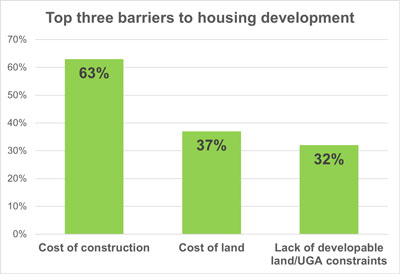By Laura Furr Mericas
In December 2021, the City of Olympia dedicated a revolutionary new housing community for individuals experiencing homelessness. Dubbed Unity Commons, the complex provides 60 units of shelter on the ground floor and 65 permanent supportive housing apartments
above for high-vulnerability single adults. There are few barriers to entry—meaning residents aren’t required to provide identification or submit to drug tests—and easy access to primary care, mental health, and substance abuse treatment.
“It’s housing that meets the needs of the individual so that people aren’t retraumatized,” says Darian Lightfoot, the city’s Housing Programs Manager. Unity Commons also happens to be the first project built, in part, with
Olympia’s new Home Fund. Created in 2018 after voters passed a levy championed by State Representative Jessica Bateman, the fund provides more than $2 million in new revenue each year for supportive and affordable housing in Olympia, with 65
percent earmarked for construction and development of new projects and the remainder allocated for programming and operations. In 2019, the city’s $1.1 million Home Fund ante provided the initial financial backing, and momentum, that were needed
to set the $22 million project in motion.
“The goal is to be the first funder,” says Lightfoot. “We award projects that are in the very early stages. We want to show local support from the beginning.”
In addition to providing seed money, the city also provided land, selling a municipally owned parcel for just $1,000 to the Low Income Housing Institute (LIHI), a respected developer known for tackling similar projects. Interfaith Works, an organization
that had been operating two shelters out of downtown church basements, signed on to provide onsite social services. Together, the partners would coordinate efforts to secure funding from the Washington State Department of Commerce Housing Trust Fund
and federal low-income housing tax credits.
“It is a collaboration, and all three parties are using their strengths,” says Lightfoot. “It’s not one agency just running themselves dry because they are trying to do all three pieces.”
In addition to providing seed money for Unity Commons, Olympia has leveraged $1.4 million from its Home Fund to help finance a 62-unit family housing project slated to begin construction this year along with a second phase of Unity Commons, which will
add a five-story affordable housing annex on the same land, with an additional $150,000 earmarked to help the local housing authority transform a hotel into a supportive housing complex.
In February, the city began making its next round of Home Fund disbursements, which Lightfoot says will put Olympia well on its way toward its goal of creating 300 housing units in the Home Fund’s first five years. And with additional support from
Thurston County’s own Home Fund, which passed in January, more support is likely on the way.
“The goal is for the city and county to collaborate,” Lightfoot adds, “to pool funds and award more funds to more projects.”
For more information: olympiawa.gov
House holds
Contrary to some rhetoric around housing development, the cost of construction, the cost of land, and urban growth area (UGA) constraints all surpassed the issue of community opposition when cities identified their top barriers. In fact, 73% of cities
do not report community opposition to growth in their top three barriers to housing, but both sides of the state list cost of construction as their top barrier.
